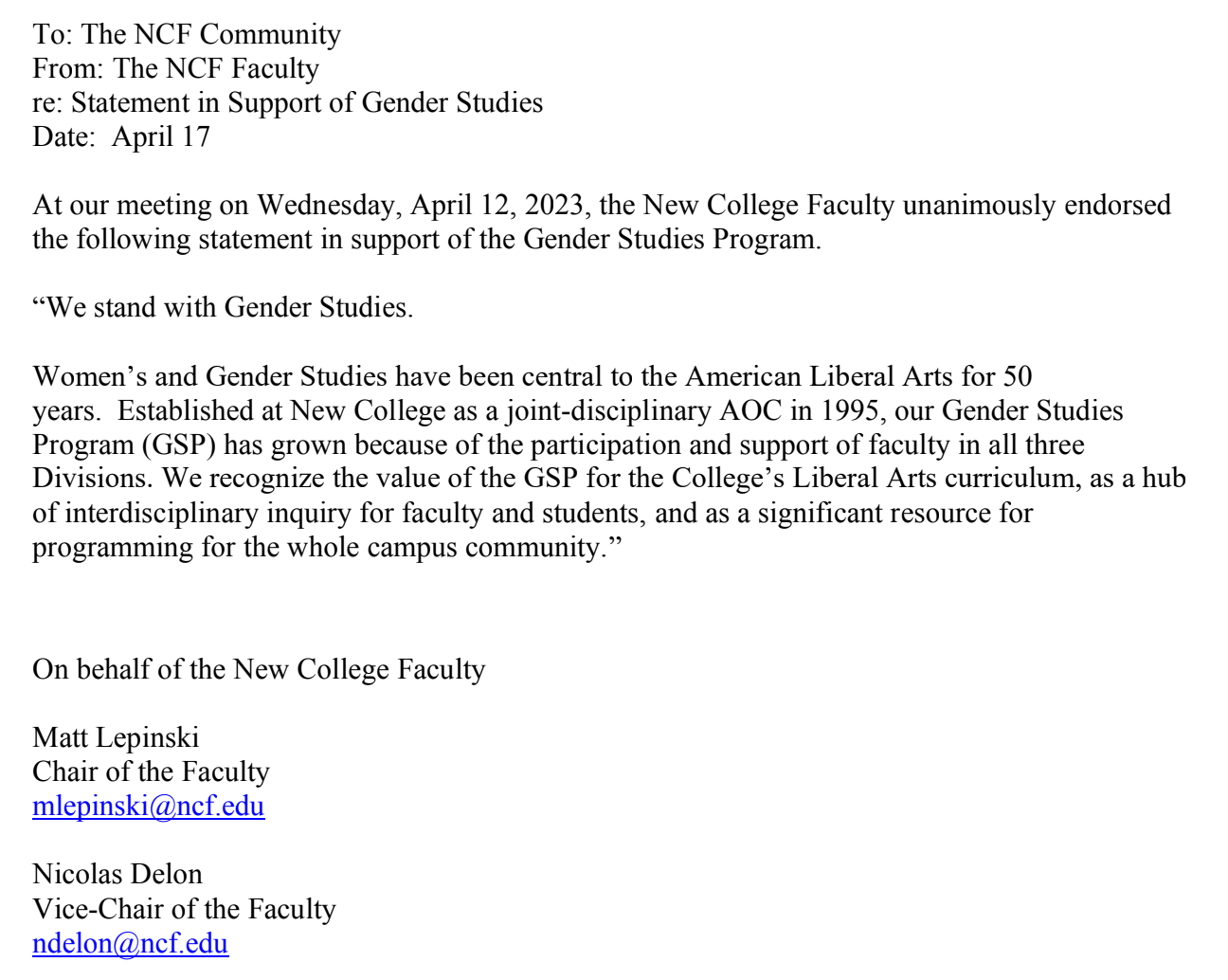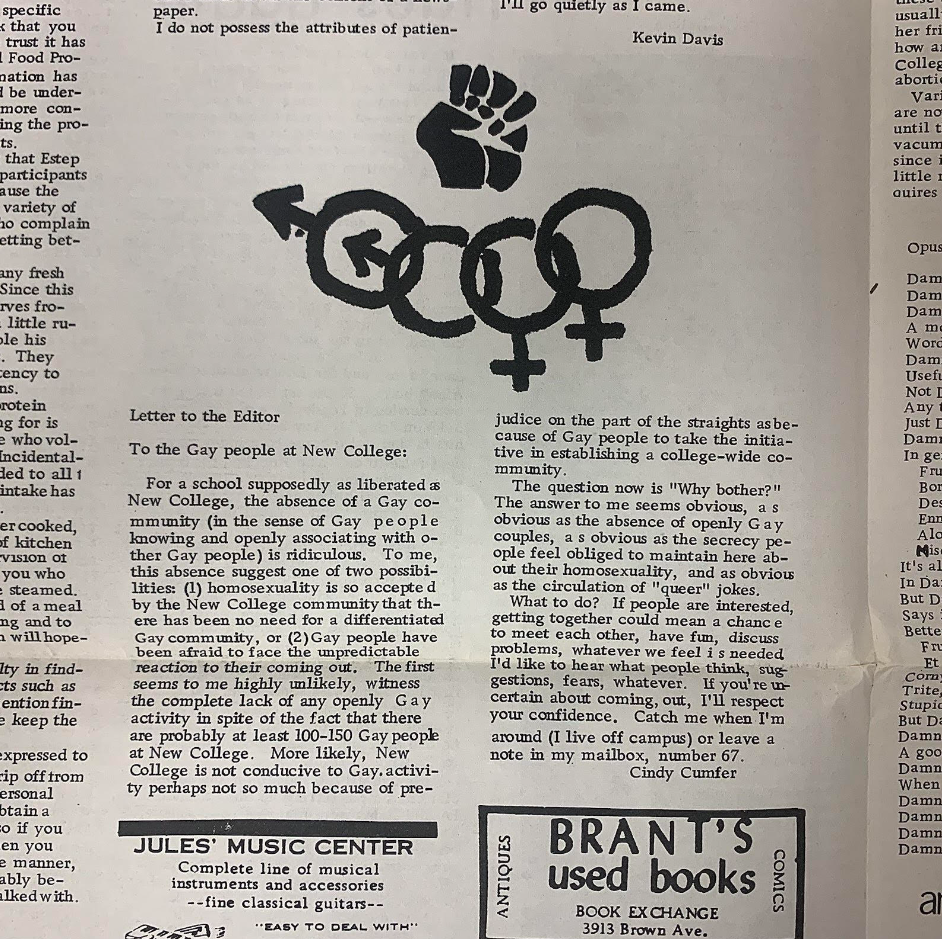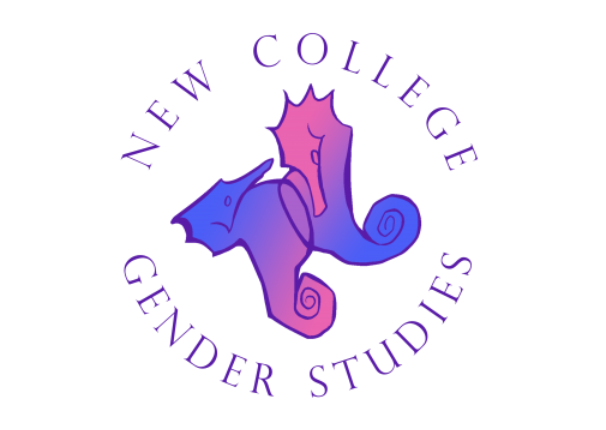Gender Studies has long solidified itself as a pertinent field of study in universities, having emerged in the 1970s from Women’s Studies. Gender Studies was established at New College in 1995 and “draws on curricula across the campus (and beyond) to introduce students to the complex focal problem of ‘gender,’” according to the official New College webpage. A spotlight is in order to highlight the research and scholarship within the Gender Studies Program at New College as current legislation continues to threaten the presence of such programs in higher education.
A common thread between students and faculty interviewed was the emphasis on the interdisciplinary nature of Gender Studies.
“I like how interdisciplinary the program is,” thesis student and Catalyst staff writer Natalie “Nat” Kornblum said. “I like the ability it gives me to view gender, both currently and historically, through several different lenses and in several different fields. This allows me to engage with theories that I sometimes don’t wholly agree with and allows me to analyze their merits and limitations, as well as offers me perspectives that I don’t have.”
“The emphasis on interdisciplinary work offers Gender Studies students a variety of experiences,” thesis student Madison Markham described. “The courses themselves really challenge your previous understandings of things like gender, sexuality, race, ability, etc.; they encourage you to use a critical lens as a scholar, and it often translates to everyday life. At such a small school, too, the faculty in the Gender Studies Program really get to learn your interests and point you toward where to dig into those topics in your academic work.”

It is the multidisciplinary nature of Gender Studies that makes research in the field so noteworthy, and faculty from a range of disciplines agree. On Apr. 17, Interim Chair of the Faculty and Associate Professor of Philosophy and Environmental Studies Nicholas Delon emailed the entire New College community with the above statement in support of the Gender Studies Program. The statement was unanimously approved by faculty members at their monthly meeting on Apr. 12 via voice vote.
Assistant Professor of Gender Studies Nicholas Clarkson spoke to the Catalyst about the program—offering insight on how classes are conducted, what readings may look like and the way in which discussions are conducted between students and their professors.
“Gender Studies courses are taught by faculty from every division,” Clarkson detailed. “This is similar to most Women’s and Gender Studies programs across the country […] There’s a misconception that doing well in Gender Studies classes means identifying as a feminist, activist and/or LGBT person or agreeing with the readings. But what I’m looking for is evidence of deep intellectual engagement with what course authors are saying. I assign readings I don’t agree with. I assign some readings I know students won’t like. Whether a student agrees or disagrees with the reading, stopping there is not satisfactory work. That doesn’t show me that a student understands how to identify and evaluate the evidence people use to support their points, engage in meaningful conversation with people whose perspectives differ from their own, draw connections between sources and across their coursework or craft a thoughtful and well-supported argument of their own. My classes are designed to teach students these crucial liberal arts skills through content that’s focused on gender, regardless of students’ political views.”
It’s through the rigorous academic structure that exists at New College that thoughtful, holistic research and students are produced. The Catalyst spoke with three thesis students that incorporate Gender Studies perspectives and methods in their work.
Kornblum, a Social Sciences Area of Concentration (AOC), worked on an ethnographic study of social and reproductive justice initiatives taking place among women in a local Unitarian Universalist community during her thesis year.
“One of my professors actually connected me with the community, and another professor helped talk me through my research interests, which encompass anthropology, sociology, writing and religion to help me develop a realistic and engaging research question and thesis topic,” Kornblum said. “I will say that Introduction to Gender Studies, which I took in 2020 with Nicholas Clarkson, was a great introduction to gender as an academic study in a variety of disciplines.”
Thesis student Ash Hoffman, known for his outstanding weekly radio program “New Radio” on WSLR, presented his thesis as an album. AMALGAM: Queering and Decolonizing Genre and Music Practice is an eight song album with an accompanying 115-page thesis paper that details his intentions as a creator “to transform musical practice into one that is more liberated, and focused outside of institutional traditions of engaging with music.”
“Its main framework revolves around the idea that genre functions the same as gender, as it is a word with a system of ideas attached to it used to essentialize and therefore limit ideas and people,” Hoffman continued. “Genre serves as a label to describe sounds and the cultures surrounding it, the same way the word girl or boy is used to describe what is thought to be the requirements for being either gender.”

Markham’s thesis research revolves around the history of New College’s queer student culture, incorporating “a mix of archival materials and in-depth, oral history interviews with alums to identify and trace themes of queer student culture across the history of the institution.” Her topic stemmed from a final project on gay liberation at New College in the 1970s for a Queer History course she took in her second year. The topic was so well fleshed out that the professor suggested it could turn into a thesis project
“The thesis process was exciting, emotionally exhausting and stressful.” Markham continued. “Queer history is really difficult to study in a few ways; archival materials are frequently lost or destroyed, so you sometimes can’t find the data you want, and it’s just full of heavy moments, like the AIDS crisis. But it was also wonderful to speak to alums and look through some really cool artifacts from the queer history of New.”
Professors and students at New College dedicate countless hours to produce quality work and analysis on topics that often intersect with one another. The three thesis student’s projects showcase that point brilliantly.
“It’s not one way of thinking or one set of ideas, it’s a set of skills that helps us as scholars look at gender in different ways,” Kornblum described. “Every culture and every time period has its own way of understanding gender, and these understandings interact with each other and with history and society, and they are worthy courses of study.”

